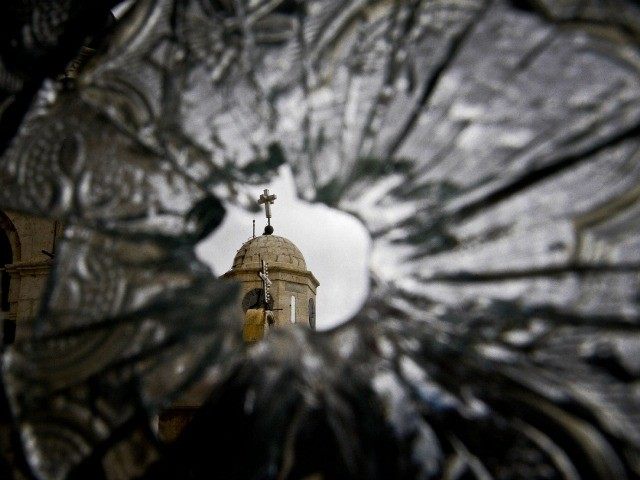TEL AVIV – In the first such visit in 35 years, the head of Egypt’s Coptic Orthodox Church attended the funeral of a local bishop in Jerusalem, sparking controversy in Egypt for Pope Tawadros and his decision to enter the Jewish state.
Reported Haaretz:
‘Some critics argued that the visit violated the ban on pilgrimages to Israel that was imposed in 1980 by Tawadros’ predecessor, Pope Shenouda III, in the wake of the 1979 Egyptian-Israeli peace treaty. The church said no actions should be taken that could be interpreted as normalization of relations with Israel, as long as Jerusalem was defined as occupied territory.
‘Supporters of the visit say the ban was political and that Egyptian Copts should be allowed to travel anywhere in the world.’
Coptic Christians made up the majority in Egypt until several centuries after the Arab conquest of the seventh century. They now account for only 5 to 10 per cent of the population, according to statistics.
Following the rise of the Muslim Brotherhood during the start of the so-called Arab Spring, Muslim villagers in March 2011 reportedly set fire to a Coptic church while attacking Christians on the streets.
In 2011 and 2012, two Coptic churches were set on fire in the Imbaba neighborhood of Cairo and in Edfu in the south of the country.
Coptic Christian families were also reportedly evicted from their homes in Alexandria and a church there was the target of a January 2011 bombing, killing 21 and wounding 70. There were reports that more than 200,000 Copts had fled their homes during the tenure of the Muslim Brotherhood in the country.
When Copts attempted to protest in October 2012, security forces reportedly fired at the protesters, killing 24 and wounding more than 300 people.
Breitbart Jerusalem discussed Tawadros’ visit to Israel and the reports of Christian persecution in Egypt with Abu Ubaidah al-Maqdisi, a senior member the Mujahedeen Shura Council, a Salafi group based in the Egyptian Sinai. The Council previously took responsibility for the firing of rockets from Sinai to the Israeli southern resort city of Eilat.
During the interview, Maqdisi referred to the Coptic leader as “the Christian crusader Tawadros” and claimed Tawadros and the “Zionist enemy” are “part of the ongoing conspiracy against Islam and Muslims.”
“They are a part of the same crusader campaign against Islam and Muslims anywhere in the world and they are part of the alignment which helps the Arab dictators wage war against the Islamists in their countries, the same dictators whose purpose is to help the Crusaders in ruling over the Islamic states.”
Asked about the rampant reports of Christian persecution in Egypt, Maqdisi replied:
“This is obviously a lie. We know that Christians leaders, especially in the U.S., are attempting to spread this propaganda, but this is false propaganda.
The investigations regarding the bombing of the church in Alexandria, the evening of [President Hosni] Mubarak’s ousting in 2011, they proved that this was an attack timed by the Egyptian secretary of defense in order to justify the continuation of the emergency edicts and to grant more authority and influence to Egypt’s Christians at the expense of the Muslims.
These attacks were meant to justify the war waged by Mubarak’s regime on our brothers, the Mujahedeen.”
Maqdadis vowed, “We shall not allow the Christians and the Crusaders and the Infidels to rule our country. We are at a battle to impose the Islamic caliphate on the whole world. Eventually, Islam will be the only victor in the world.”
And what of the fate of Christians living in a future Caliphate?
Maqdidis stated dryly:
“Today, the Islamic state rules over vast areas in Syria and Iraq despite the campaign against it by the crusader infidels. Christians carry on living in those regions over which the Islamic state governs. No one has expelled them.
“They were asked to choose between paying a protection tax, the Jizya, or moving out. We respect their decisions. If they choose to stay and refuse to pay the Jizyah, they are sentenced according to Islamic law, but are not executed.”

COMMENTS
Please let us know if you're having issues with commenting.